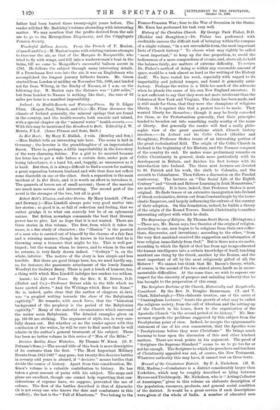History of the Christian Church. By George Park Fisher, D.D.
(Hodder and Stoughton.)—Dr. Fisher has performed with creditable success the difficult task of bringing within the compass of a single volume, "in a not unreadable form, the most important facts of Church history." To choose what may rightly be called "most important," to keep up the due proportion, to avoid the tediousness of a mere compendium of events, and, above all, to hold the balance fairly, are matters of extreme difficulty. To review Dr. Fisher's method of doing so within any reasonable amount of space, would be a task almost as hard as the writing of the History itself. We have tested his work, especially with regard to its impartiality and judicial temper, and found it generally satis- factory. Perhaps the writer is a little too much of the advocate when he pleads the cause of his own New England ancestors. It . is not sufficient to say that they were not more intolerant than the Colonies of New York and Virginia. The claim has been made, and is still made for them, that they were the champions of religious liberty. It is against this that a protest has to be made. They wanted liberty for themselves ; though it may be freely conceded for them, as for Protestantism generally, that their principles tended to broaden out into something really worthy of the name of liberty. But generally the reader will find a really philo- sophic view of the great questions which Church history involves.—In Ireland and the Celtic Church (Hodder and Stoughton), Professor Stokes treats of an interesting portion of the great ecclesiastical field. The origin of the Celtic Church in Ireland is the beginning of his History, and the Norman conquest of the country its end. He makes some preliminary remarks on Celtic Christianity in general, deals more particularly with its development in Britain, and finishes his first lecture with its introduction into Ireland. The three next lectures are devoted to St. Patrick and his work, the sixth to Columba, and the seventh to Columbanus. Then follows a discussion on the Paschal controversy. The lectures on "The Social Life of the Eighth Century" and "Greek and Hebrew Learning in Irish Monasteries," are noteworthy. It is here, indeed, that Professor Stokes is most original. He finds traces of an extensive immigration into Ireland of Greek ecclesiastics, driven out from Constantinople by the icono- clastic Emperors, and largely influencing the culture of the country of their adoption. On this foundation, indeed, he builds a theory of the origin of the Round Towers. Danish Christianity is another interesting subject with which he deals.


















































 Previous page
Previous page